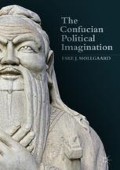Abstract
The Confucian Great Unity (datong) of ruler-Confucians-people is a sacred power similar to the God-King-Nation unity in Western Christian culture, and today it is undergoing its own secularization. This chapter considers each part of the Great Unity in its process of weakening: the Communist Party is transforming from charismatic to technocratic authority; Chinese intellectuals are increasingly functioning as mere professionals; and the common people strike out on their own in a brave new world of individualism. The result is that the ideal of Great Unity is beginning to decline, and it is uncertain if Confucianism can survive this deflation of its highest ideal.
Access this chapter
Tax calculation will be finalised at checkout
Purchases are for personal use only
References
Agamben, Giorgio (2007) Profanations, trans. Jeff Fort, New York: Zone Books.
Althusser, Louis (1970) “Ideological State Apparatuses (Notes towards an Investigation),” in Lenin and Philosophy and Other Essays, London: Verso.
Ci, Jiwei (2014) Moral China in the Age of Reform, New York and Cambridge: Cambridge University Press.
Davies, Gloria (2012) “Homo Dissensum Significans, or The Perils of Taking a Stand in China,” Social Text 29 (4): 29–56.
Davies, Gloria (2007) Worrying About China: The Language of Chinese Critical Inquiry, Cambridge: Harvard University Press.
El Amine, Loubna (2015) Classical Confucian Political Thought: A New Interpretation, Princeton: Princeton University Press.
Evasdottir, Erika E. S. (2004) Obedient Autonomy: Chinese Intellectuals and the Achievement of Orderly Life, Honolulu: University of Hawai’I Press.
Gardner, Daniel K. (1986) Chu Hsi and the Ta-hsueh: Neo-Confucian Reflection on the Confucian Canon, Cambridge: Harvard University Press.
Han, Han (2010) “Kan Kongzi 看孔字,” Retrieved December 19, 2011, from http://blog.sina.com.cn/s/blog_4701280b0100gqf8.html
Jullien, François (1998) Un sage est sans idée: Ou l’autre de la philosophie, Paris: Seuil.
Lau, D. C. (1984) Mencius, 2 vols, Hong Kong: The Chinese University Press.
Lee, Ching Kwan (2007) Against the Law: Labor Protests in China’s Rustbelt and Sunbelt, Berkeley: University of California Press.
Lieberthal, Kenneth G. (1992) “Introduction: The ‘Fragmented Authoritarianism’ Model and Its Limitations,” in Bureaucracy, Politics, and Decision Making in Post-Mao China, Berkeley: University of California Press.
Lunyu zhengyi 論語正義 (1990) Annotated by Liu Baonan, Two Volumes, Beijing: Zhonghua.
McGregor, Richard (2010) The Party: The Secret World of China’s Communist Rulers, New York: HarperCollins.
Mengzi zhengyi 孟子正義 (1987) Annotated by Jiao Xun, Two Volumes, Beijing: Zhonghua.
Mertha, Andrew (2010) “Society in the State: China’s Nondemocratic Political Pluralism,” in Peter Hays Gries and Stanley Rosen (eds) Chinese Politics: State, Society and the Market, London: Routledge.
Metzger, Thomas A. (2005) A Cloud Across the Pacific: Essays on the Clash Between Chinese and Western Political Theories Today, Hong Kong: The Chinese University Press.
Nylan, Michael (2001) The Five “Confucian” Classics, New Haven: Yale University Press.
Pines, Yuri (2009) Envisioning Eternal Empire: Chinese Political Thought of the Warring States Era, Honolulu: University of Hawai’i Press.
Pippin, Robert B. (2005) “The Ethical Status of Civility,” in The Persistence of Subjectivity: On the Kantian Aftermath, Cambridge: Cambridge University Press.
Ringen, Stein et al. (2013) “Is the ‘China Dream’ Real? Or Just Empty Propaganda?” The Atlantic, China File, July 10.
Rong, Jian (2017) “A China Bereft of Thought,” trans. Gloria Davis, Australian Centre on China in the World, The China Story, Posted on February 5 2017.
Sapio, Flora (2010) Sovereign Power and the
Lawin China, China Studies Volume 18, Leiden: Brill.Song, Xianlin (2003) “Reconstructing the Confucian Ideal in 1980s China: The ‘Culture Craze’ and New Confucianism,” in J. Makeham (ed) New Confucianism: A Critical Examination, New York: Palgrave Macmillan.
Vattimo, Gianni (1993) The Adventure of Difference: Philosophy After Nietzsche and Heidegger, Cambridge: Polity Press.
Wright, Teresa (2010) Accepting Authoritarianism: State-Society Relations in China’s Reform Era, Stanford: Stanford University Press.
Xi, Chuan (2012) “Afterword: The Tradition This Instant,” in Notes on the Mosquito: Selected Poems, trans. Lucas Klein, New York: New Directions Books.
Xunzi 荀子. Li, Disheng (2000) Xunzi Jishi 荀子集釋, Taibei: Xuesheng Shuju.
Yan, Yunxiang (2011) “The Changing Moral Landscape,” in Deep China: The Moral Life of the Person. What Anthropology and Psychiatry Tell Us About China Today, Berkeley: University of California Press.
Zarrow, Peter (2012) After Empire: The Conceptual Transformation of the Chinese State, 1885–1924, Stanford: Stanford University Press.
Zheng, Yongnian (2010) The Chinese Communist Party as Organizational Emperor: Culture, Reproduction and Transformation, London: Routledge.
Author information
Authors and Affiliations
Rights and permissions
Copyright information
© 2018 The Author(s)
About this chapter
Cite this chapter
Møllgaard, E.J. (2018). Decline of the Great Unity. In: The Confucian Political Imagination. Palgrave Macmillan, Cham. https://doi.org/10.1007/978-3-319-74899-3_7
Download citation
DOI: https://doi.org/10.1007/978-3-319-74899-3_7
Published:
Publisher Name: Palgrave Macmillan, Cham
Print ISBN: 978-3-319-74898-6
Online ISBN: 978-3-319-74899-3
eBook Packages: Religion and PhilosophyPhilosophy and Religion (R0)

